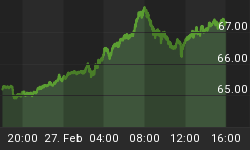As a former army parachutist with a bad head for heights, I recall standing in the doorway of an aircraft while my jumping instructor shouted: "Don't look down!" He understood that my unease with parachuting combined with the sight of thousands of feet of open air could be enough to elicit panic. Many investors in today's American stock and bond markets appear to be getting the same advice. While in my predicament, I had a parachute and a rudimentary understanding of how to use it, I fear that American investors have nothing to break their fall.
Looking down from the lofty nominal heights of today's American stock and bond markets, there is cause for real concern.
First, the Dow has risen 62% over the past ten months.[i] Despite the fact that a market collapse appears to have been averted - for a time, at least - this normally would be considered an unhealthy speed. This rapid rise may be the result of government and media cheerleading, which have been based in part on government statistics whose accuracy gives additional cause for concern. In short, the stock markets appear to be heavily overbought.
Second, the somewhat surprisingly solid earnings posted by American companies over the past year have been achieved largely by savage labor cuts, inventory depletion, margin reductions and reduced research and advertising expenses.[ii] It is doubtful that such cuts can be continued over the longer term. At the same time, the top-line revenues of many companies have been in decline, threatening future earnings. These are not the types of metrics that would normally inspire long term confidence.
Third, in addition to these pricing concerns, the stock market corrections of last week appear to have been reflecting a growing wave of uncertainties, which markets detest. The biggest questions involve the outlook for interest rates. Despite the "extended period" language that seems to be permanently chiseled into the Federal Reserve policy statements, interest rates are set to climb sooner or later, threatening both the bond and stock markets. Now that Ben Bernanke has been re-appointed as Fed Chairman, he will try to hold rates down far into the future. However, the massive Treasury borrowing program, together with reckless government spending proposals, are forcing rates upwards, especially at the long end.[iii]
Fourth, the prospect of an imminent economic recovery is far from certain. With the U.S. jobless rate continuing to mount towards depressionary levels[iv] and China announcing a curb to its high economic growth,[v] it is likely that the economy will soon face a dramatic aftershock of falling demand and asset prices. In addition, major governments abroad, yielding to taxpayers and bond buyers, may be winding down their stimulus packages. Although the removal of these government interventions is a long term positive, in the short run this would certainly pull the rug out from under this recent rally.
Fifth, and most alarmingly, developments in recent months have exposed great uncertainty in the policy direction of the U.S. government. In particular, Scott Brown's victory in Massachusetts, in the minds of some investors, has raised the possibility of Republican election victories, which could favor the kinds of pro-business policies that are beneficial to stock prices. However, since the days of President Ronald Reagan, the Republican Party, much like the Democratic Party, fosters big government, the antithesis of what is needed for economic revival.
If investors in the American stock and bond markets adhere to my parachute instructor's advice to not look down, they may remain happy for a time. However, without a parachute, unable to recognize the faults in their financial equipment, and instilled with baseless confidence, they may well regret going so high and risking such a massive free-fall.
My advice would be to look for a good parachute - preferably a golden one.
[i] 2009/03/09-2010/01/09. Dow Jones Industrial Average historical chart. Yahoo! Finance.
[ii] 2009/08/09. "Corporate Earnings Are No Sign of Recovery". Wall Street Journal.
[iii] 2009/01/01-2010/01/28. "Daily Treasury Yield Curve Rates." United States Treasury.
[iv] 2010/01/12. "How nation's true jobless rate is closer to 22%". New York Post.
[v] 2010/01/27. "China Tightens Reins on Loans". Wall Street Journal.
For a more in-depth analysis of our financial problems and the inherent dangers they pose for the U.S. economy and U.S. dollar, read Peter Schiff's 2008 bestseller "The Little Book of Bull Moves in Bear Markets" and his newest release "Crash Proof 2.0: How to Profit from the Economic Collapse." Click here to learn more.
More importantly, don't let the great deals pass you by. Get an inside view of Peter's playbook with his new Special Report, "Peter Schiff's Five Favorite Investment Choices for the Next Five Years." Click here to dowload the report for free. You can find more free services for global investors, and learn about the Euro Pacific advantage, at www.europac.net.















